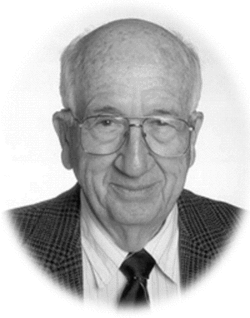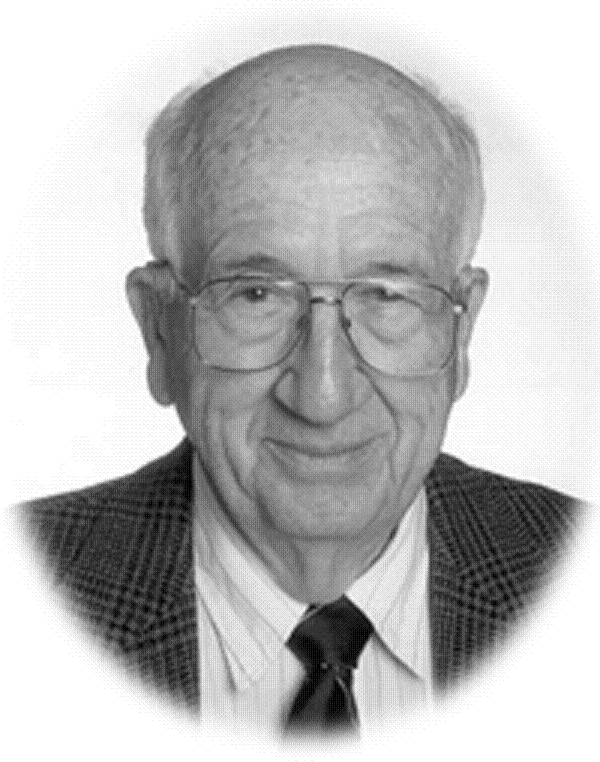Dr. J. Edwin Seegmiller's scholarly pursuit of new solutions to old problems led him on a path of discovery that illuminated diseases ranging from those of childhood to old age.
By 1983, when he founded what today is the University of California San Diego's Stein Institute of Research on Aging, Dr. Seegmiller was one of the country's leading metabolic researchers and an authority on a form of arthritis known as gout.
"If anyone could claim to be the father of genetic medicine, it was Jay Seegmiller," said Barry Lebowitz, deputy director of the institute. "Some of the things he did changed how we look at health and disease across a life span."
Dr. Seegmiller, who stepped down as the institute's director in 1990 after reaching mandatory retirement age, died May 31 at UCSD's Thornton Hospital. He was 85.
The cause of death was complications from adult respiratory distress syndrome, which was diagnosed early last month, said daughter Dale Seegmiller Maudlin.
In launching the Stein Institute of Research on Aging, Dr. Seegmiller was at the forefront of a movement in academic medicine to explore issues of compelling interest to an aging population. The first wave of baby boomers had not yet turned 40, and geriatric research hadn't become a fixture in university medical settings.
"Today, about two-thirds of schools of medicine have some kind of division of geriatric medicine," Lebowitz said.
Lacking funding and personnel, Dr. Seegmiller and his assistant, Betty Stevens, started a monthly public newsletter and public lecture series. Within a year, they had attracted Dr. George Glenner, a pioneer in Alzheimer's disease research, to their cause.
As the first aging-focused research unit with the University of California system, the institute went on to earn research grants and enlist more than 100 faculty in such fields as orthopedics, family and preventive medicine, neurosciences, psychiatry and epidemiology.
"Dr. Seegmiller wanted it to be broad in concept in terms of having interest in science, education and in improving clinical care -- across the whole spectrum of what we do in academic medicine," Lebowitz said.
Until his illness, Dr. Seegmiller was the institute's associate director. He worked a full day at his office and organized a public lecture series on aging for UCSD's public television station.
"He had very few passions in life: his work and his family," Maudlin said. "He was very focused on his life's work, always looking forward to the next thing."
Four years ago, addressing new medical students at UCSD, Dr. Seegmiller shared his passion for pursuing new solutions to old problems.
What research is all about, he said, is "learning how to ask questions of Mother Nature that can be answered by her in results that tell you 'yes' or 'no.' "
Jarvis Edwin Seegmiller, the youngest of nine children in his farming family, was born June 22, 1920, in St. George, Utah.
He graduated Phi Beta Kappa in chemistry from the University of Utah in 1942 and earned his medical degree in 1948 from the University of Chicago.
Beginning in 1954 at the National Institutes of Health, he conducted biochemical and clinical studies of human hereditary disease, focusing on those causing various forms of arthritis.
His laboratory identified a wide range of primary metabolic defects in metabolism responsible for the development of gout and pioneered the use of tissue culture to study those metabolic defects.
In 1966, he was among the first NIH leaders recruited to help launch a new medical school at UCSD.
As director of the human biochemical genetics program at UCSD, Dr. Seegmiller oversaw research that led to congressional testimony concerning the prospects of controlling genetic disease in the United States. Genetic referral centers eventually were established throughout the country.
Dr. Seegmiller received worldwide recognition for his discovery of the enzyme effect in Lesch-Nyhan Syndrome, a fatal genetic disorder of the nervous system causing severe mental retardation and self-mutilation impulses.
Foreshadowing his increasing interest in aging, Dr. Seegmiller took blood samples in a 1974 study of some of the world's oldest people in the remote village of Vilcabamba in Ecuador.
Dr. Seegmiller's subsequent work shed light on the role of free radicals in weakening humans' resistance to disease.
His first wife, Roberta Eads Seegmiller, died in 1992. In 1995, he married Barbara Ellertson.
Survivors include his wife, Barbara; daughters, Dale Seegmiller Maudlin of Solana Beach and Lisa Seegmiller Taylor of Palo Alto; sons, Robert Edwin Seegmiller of San Diego and Richard Lewis Seegmiller of Sugarland, Texas; stepsons, Gary Ellertson of El Cajon, David Ellertson of Temecula and Randy Ellertson of Chula Vista; sisters, Rose Bell of Redding and Deola Bell of Ridgecrest; and 17 grandchildren.
Services are scheduled for 11 a.m. Friday at the Church of Jesus Christ of Latter-day Saints, 4741 Mount Abernathy Ave., San Diego. Interment will be at El Camino Memorial Park. Donations are suggested to UCSD's Stein Institute for Research on Aging, www.sira.ucsd.edu.
Dr. J. Edwin Seegmiller's scholarly pursuit of new solutions to old problems led him on a path of discovery that illuminated diseases ranging from those of childhood to old age.
By 1983, when he founded what today is the University of California San Diego's Stein Institute of Research on Aging, Dr. Seegmiller was one of the country's leading metabolic researchers and an authority on a form of arthritis known as gout.
"If anyone could claim to be the father of genetic medicine, it was Jay Seegmiller," said Barry Lebowitz, deputy director of the institute. "Some of the things he did changed how we look at health and disease across a life span."
Dr. Seegmiller, who stepped down as the institute's director in 1990 after reaching mandatory retirement age, died May 31 at UCSD's Thornton Hospital. He was 85.
The cause of death was complications from adult respiratory distress syndrome, which was diagnosed early last month, said daughter Dale Seegmiller Maudlin.
In launching the Stein Institute of Research on Aging, Dr. Seegmiller was at the forefront of a movement in academic medicine to explore issues of compelling interest to an aging population. The first wave of baby boomers had not yet turned 40, and geriatric research hadn't become a fixture in university medical settings.
"Today, about two-thirds of schools of medicine have some kind of division of geriatric medicine," Lebowitz said.
Lacking funding and personnel, Dr. Seegmiller and his assistant, Betty Stevens, started a monthly public newsletter and public lecture series. Within a year, they had attracted Dr. George Glenner, a pioneer in Alzheimer's disease research, to their cause.
As the first aging-focused research unit with the University of California system, the institute went on to earn research grants and enlist more than 100 faculty in such fields as orthopedics, family and preventive medicine, neurosciences, psychiatry and epidemiology.
"Dr. Seegmiller wanted it to be broad in concept in terms of having interest in science, education and in improving clinical care -- across the whole spectrum of what we do in academic medicine," Lebowitz said.
Until his illness, Dr. Seegmiller was the institute's associate director. He worked a full day at his office and organized a public lecture series on aging for UCSD's public television station.
"He had very few passions in life: his work and his family," Maudlin said. "He was very focused on his life's work, always looking forward to the next thing."
Four years ago, addressing new medical students at UCSD, Dr. Seegmiller shared his passion for pursuing new solutions to old problems.
What research is all about, he said, is "learning how to ask questions of Mother Nature that can be answered by her in results that tell you 'yes' or 'no.' "
Jarvis Edwin Seegmiller, the youngest of nine children in his farming family, was born June 22, 1920, in St. George, Utah.
He graduated Phi Beta Kappa in chemistry from the University of Utah in 1942 and earned his medical degree in 1948 from the University of Chicago.
Beginning in 1954 at the National Institutes of Health, he conducted biochemical and clinical studies of human hereditary disease, focusing on those causing various forms of arthritis.
His laboratory identified a wide range of primary metabolic defects in metabolism responsible for the development of gout and pioneered the use of tissue culture to study those metabolic defects.
In 1966, he was among the first NIH leaders recruited to help launch a new medical school at UCSD.
As director of the human biochemical genetics program at UCSD, Dr. Seegmiller oversaw research that led to congressional testimony concerning the prospects of controlling genetic disease in the United States. Genetic referral centers eventually were established throughout the country.
Dr. Seegmiller received worldwide recognition for his discovery of the enzyme effect in Lesch-Nyhan Syndrome, a fatal genetic disorder of the nervous system causing severe mental retardation and self-mutilation impulses.
Foreshadowing his increasing interest in aging, Dr. Seegmiller took blood samples in a 1974 study of some of the world's oldest people in the remote village of Vilcabamba in Ecuador.
Dr. Seegmiller's subsequent work shed light on the role of free radicals in weakening humans' resistance to disease.
His first wife, Roberta Eads Seegmiller, died in 1992. In 1995, he married Barbara Ellertson.
Survivors include his wife, Barbara; daughters, Dale Seegmiller Maudlin of Solana Beach and Lisa Seegmiller Taylor of Palo Alto; sons, Robert Edwin Seegmiller of San Diego and Richard Lewis Seegmiller of Sugarland, Texas; stepsons, Gary Ellertson of El Cajon, David Ellertson of Temecula and Randy Ellertson of Chula Vista; sisters, Rose Bell of Redding and Deola Bell of Ridgecrest; and 17 grandchildren.
Services are scheduled for 11 a.m. Friday at the Church of Jesus Christ of Latter-day Saints, 4741 Mount Abernathy Ave., San Diego. Interment will be at El Camino Memorial Park. Donations are suggested to UCSD's Stein Institute for Research on Aging, www.sira.ucsd.edu.
Family Members
Sponsored by Ancestry
Advertisement
Records on Ancestry
Advertisement








